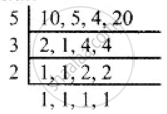Advertisements
Advertisements
Question
Arrange the following rational numbers in ascending and descending order
`(-17)/10, (-7)/5, 0, (-2)/4, (-19)/20`
Solution
`(-17)/10, (-7)/5, 0, (-2)/4, (-19)/20`
L.C.M of 10, 5, 4, 20 is 5 × 2 × 2 = 20
Hint:
`(-17)/10 = (-17 xx 2)/(10 xx 2) = (-34)/20`
`(-7)/5 = (-7 xx 4)/(5 xx 4) = (-28)/20`
`(-2)/4 = (-2 xx 5)/(4 xx 5) = (-10)/20`
`(-19)/20 = (-19)/20`
Negative numbers are less than zero.
∴ Arranging the numerators we get
– 34 < – 28 < – 19 < – 10 < 0
∴ `(-34)/20 < (-28)/20 < (-19)/20 < (-10)/20 < 0`
Ascending order = `(-17)/10 < (-7)/5 < (-19)/20 < (-2)/4 < 0`
Descending order `0 > (-2)/4 > (-19)/20 > (-7)/5 > (-17)/10`
APPEARS IN
RELATED QUESTIONS
Compare the following number.
`40/29, 141/29`
Compare the following number.
`15/12, 7/16`
Compare the following number.
`12/15, 3/5`
0 is the smallest rational number
Which of the following rational numbers is the greatest?
The sum of the digits of the denominator in the simplest form of `112/528` is _________
Fill in the box with the correct symbol >, < or =.
`5/6 square 8/4`
Write the following rational numbers with positive denominators:
`5/(-8)`
Given that `p/q` and `r/s` are two rational numbers with different denominators and both of them are in standard form. To compare these rational numbers we say that:
`square/square` < `square/square`, if p × s < r × q
Chhaya simplified a rational number in this manner `(-25)/(-30) = (-5)/6`. What error did the student make?
